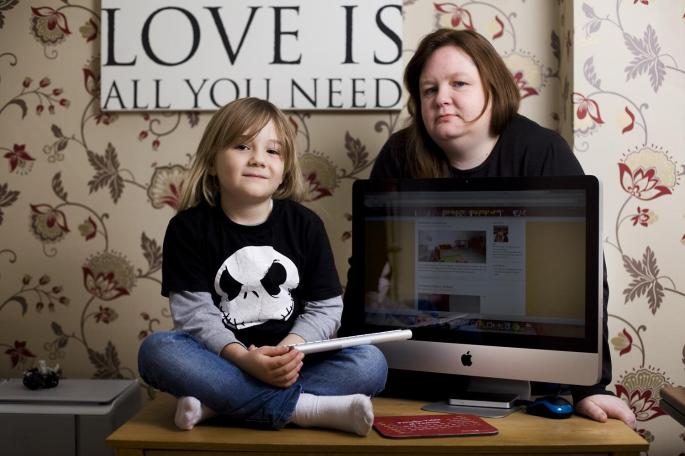
How old should your child be to start writing a blog?
My daughter is 7. One of her friends told her that she was starting a blog. Ella assumed that this was some sort of new game. She had no idea what she was talking about. She’s an intelligent child, but even once I explained it to her, I’m not sure that she understood the potential impact a blog can have on its author.
Is it acceptable to encourage your child to start blogging as soon as they can string a poorly spelt sentence together? Can they understand that they are reaching out to a global audience and archiving their thoughts?
Sally Whittle, 38, recently set up a blog for her seven-year-old daughter Flea. Fleareads.co.uk is a mixture of written and video reviews of films, books, toys and places. Sally’s own blog, whosthemummy.co.uk, has documented much of Flea’s life, so Flea has a greater insight into blogging and its effects than her peers, yet Sally was reticent at first to give in to Flea’s request for her own blog.
“I know the ups and downs. People can leave unpleasant comments and content can be cached somewhere and come back to haunt you,” Sally says.
Sally felt, however, that a blog would boost Flea’s confidence, encourage her to write and give her a head start in the socially-networked world. She set up the blog with ground rules: “We use a nickname, never her real first name or surname. It’s not a diary and she can’t mention her school or friends. It’s focused on reviews, so I hope nothing on it will mortify her in the future. She can’t access it without me and I check any comments made,” Sally says. “It’s encouraging her to think critically and she’s learning about editing and design — all valuable skills.”
The blog is updated about once a week and must take time, but both enjoy it.
“I love doing the reviews,” Flea says. “I like writing, but I don’t like doing typing. When I’ve had enough I talk to Mummy and she writes it up. I like doing the filming too. My friends think I’m lucky to have a blog. I did a review of the book Spy Dog and the author sent me a signed copy of his new book.
“I get sent loads of stuff too. My next blog is going to be on the Playmobil mansion, which they sent me because I am a ‘playologist’ for them and they send me all their new stuff.”
Child bloggers can become spoilt, Sally warns. “Flea finds it perplexing if we go to a theme park and have to queue, for example, because we haven’t gone through the PR.”
Although she gets freebies, Flea’s site doesn’t bring in any income. Sally doesn’t allow advertising on it and treats it purely as a hobby. Money can be made from a child’s blog, however. Rebecca Mahony, VP global marketing at social video advertising firm Ebuzzing, says: “I would estimate that the blog you have shown as an example [Fleareads] would make no more than perhaps £50 for an article and monthly video revenue of merely a few pounds on a pay-per-view basis.” She adds that it is not her company’s policy to approach child bloggers.
While the possible financial returns seem low, add in the free trips and toys and the extra gloss that a blog could give to your child’s next school application, it could turn into a valuable sideline.
But blogging can become another outlet for pushy parents to try to capitalise on their children, warns Dr Amanda Gummer, a psychologist specialising in child development. “You’ll see the same parents who push their children into modelling, encouraging their children to blog to give them an edge and bring in some extra income. But unless it’s very carefully controlled by the parents blogging can be damaging for a child, especially if they treat it like a diary.”
Under a watchful eye, however, blogging can be a fantastic outlet for a child’s creative expression, Gummer says. “I’m not against child blogging, in a closed-circuit environment where only those invited can see the blog. Blogging promotes their level of literacy, makes them familiar with the workings of a computer, it can be an outlet for their emotions and ideas and give them a voice,” she says. “In a more public context the parent has a duty to impose strict controls over what is published on the site, because it could cause tremendous upset.”
For a safe and successful child blog in the public domain it seems you need two things: a willing, motivated child who wants to feel a hint of fame and a parent with the time and desire to act as typist, cameraman, IT consultant, PR and comment mediator.
I won’t be encouraging my children to blog. If they show any desire to do so I’d rather they did it in a closed environment such as the school-based blogging site Kidblog.
Kids online
tollydollyposhfashion.com
A 12-year-old fashionista
supertomblog.com
Six-year-old Tom’s adventures
what-should-i-read-next.blogspot.co.uk
A 14-year-old bookworm’s blog
jakes-bones.com
A 10-year-old bone collector
libdemchild.blogspot.co.uk
A 13-year-old girl’s Liberal Democratic ponderings
notallaboutboys.com
A teenage girl with opinions that don’t just centre on boys
actuallymummy.co.uk
A loquacious school girl, aged 7
opheliahorton.wordpress.com
A 12-year-old’s style blog
glosonblog.com
Social media and tech tips from a 14-year-old boy in Malaysia

